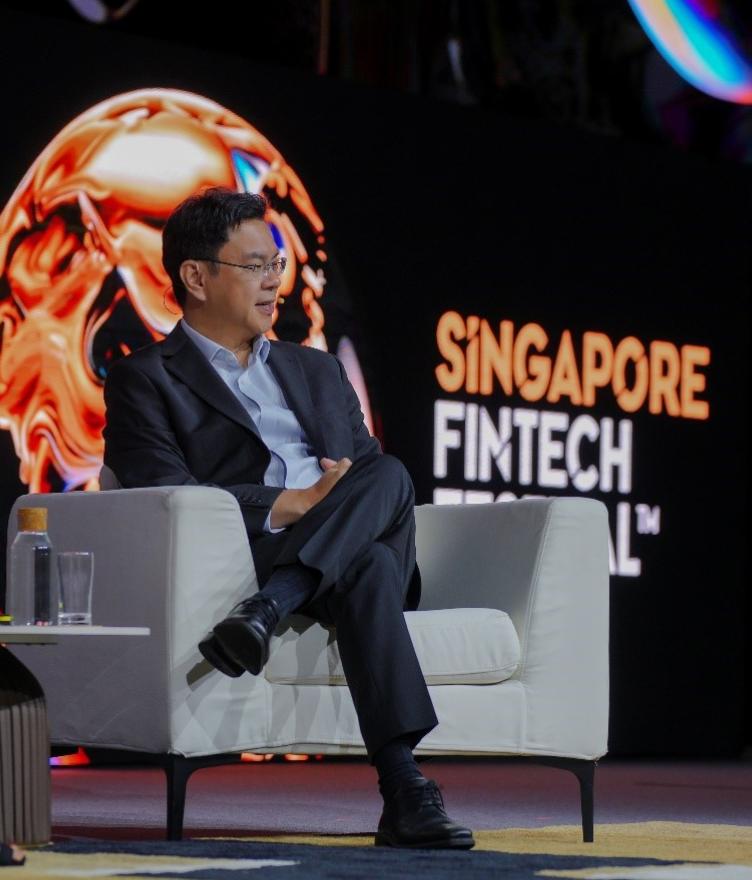As the incoming Trump administration ushers in new global dynamics, South-east Asia is building resilient bridges to forge responsible fintech innovation
South-east Asia (SEA) is at the forefront of a transformative journey in financial technology, with three principles — collaboration, community-building, and capability development — playing key roles in fostering a more inclusive financial ecosystem.
According to Chia Der Jiun, the new managing director of the Monetary Authority of Singapore (MAS), the collaborative spirit in SEA’s fintech ecosystem is thriving, underpinned by a community of startups, financial institutions, regulators, and international organizations. At the heart of this movement is the goal of making financial services more inclusive and accessible, particularly in a region where large portions of the population remain underserved by traditional banking services.

Sharing his views at a fireside chat at the Singapore Fintech Festival on 7 Nov 2024, Chia elaborated on five themes in his agency’s region-wide commitment to ensure that innovation in financial services benefits all segments of society in the region — especially in the face of news that Donald Trump had just won the Presidential Election by a landslide.
- A thriving community of innovation
SEA’s financial services sector is now witnessing an explosion of innovation, driven by partnerships and shared efforts to build a more interconnected and accessible financial ecosystem.
The launch of global initiatives like the Global FinTech Network (GFTN) signals a new level of ambition to create a broad, supportive community that not only fosters growth but also strengthens global ties within the financial ecosystem. These efforts aim to establish platforms where financial services providers across the region can collaborate to meet local needs while remaining competitive on a global scale.
The establishment of industry consortia, involving regulators, policymakers, and industry players, further strengthens this collaborative model. For example, in the realm of digital assets, over 20 financial institutions and international organizations are coming together to address challenges, share knowledge, and build solutions that benefit the entire ecosystem.
These cross-border alliances are not only advancing technological innovations such as AI and blockchain, but are also providing new pathways for financial inclusion by ensuring that innovations reach underserved communities. - Fostering cross-border cooperation in payment tech
According to Chia, one of the most exciting developments in SEA is the ongoing transformation of cross-border payments. With many South-east Asian countries sharing a strong economic interdependence, improving cross-border payment systems is key to ensuring greater financial inclusion. The challenge, however, lies in overcoming the fragmented payment systems that currently exist.
The region has already seen successful bilateral linkages, such as those between Singapore and Thailand, India, and Malaysia. These linkages have improved payment speed and efficiency, but the goal is to build an interoperable, multilateral system that connects the entire region.
This vision is embodied in Project Nexus, a collaborative effort involving ASEAN nations and the Bank for International Settlements (BIS) Innovation Hub. Project Nexus seeks to create a central switch with a unified framework of standards, simplifying cross-border payments across Southeast Asia. As Chia emphasized: “This central system will enable seamless and cost-effective transactions, regardless of the specific payment system in place in each country.”
By connecting national systems to a central hub, SEA’s financial landscape will become more cohesive, allowing businesses and individuals to make faster, cheaper, and more reliable transactions across borders. This regional initiative will also enable the region to connect to global payment networks, further enhancing the region’s financial inclusiveness. - Advancing tokenization for shared economic growth
Asset tokenization, a concept rapidly gaining traction worldwide, holds immense potential for SEA’s financial future: Chia highlighted the role of MAS’s Project Guardian, which brings together global financial institutions to explore the benefits of tokenizing traditional assets like bonds, equities, and currencies. He noted: “Tokenization can cut costs, increase efficiency, and unlock new investment opportunities. The success of these initiatives is a testament to the transformative power of this technology.”
However, scaling these innovations presents significant challenges. A collaborative approach is necessary to solve key issues, such as standardizing tokenized asset data and ensuring compliance with existing financial regulations. Industry consortia, like Global Layer One, are already addressing these problems, working to establish frameworks that will harmonize the legal and technological aspects of asset tokenization. Chia stressed that, “through these efforts, we are not only advancing the development of tokenized markets but also ensuring that the benefits of these innovations are accessible to a broader spectrum of participants.” - Harnessing the power of GenAI responsibly
The rise of generative AI (GenAI) is another area where SEA is positioning itself as a global leader, said Chia. However, the implementation of GenAI, particularly in the region’s collective financial sector, requires careful attention to risk management, governance, and ethical considerations.
Rather than rushing to regulate, MAS has adopted a cautious and collaborative approach, setting up industry consortiums like Project MindForge.
These initiatives allow regulators and industry players to come together and address the risks associated with AI, including issues like explainability, data privacy, and potential misuse. By engaging with stakeholders in the early stages, SEA is ensuring that the region can fully harness the benefits of AI while maintaining high standards of security and ethical behavior. - Sustainable finance: driving long-term change
Sustainability is a critical concern for the region, given its vulnerability to climate change and its growing role in the global economy. The region is increasingly recognizing the transformative potential of sustainable finance, and financial institutions are taking steps to align their strategies with Environmental, Social, and Governance goals. As Chia noted: “Sustainable finance is not just a trend, it’s the future. And for SEA, it’s also a critical tool for navigating the challenges of climate change.”
SEA is embracing regulatory initiatives to ensure that sustainable finance becomes a mainstream practice. Chia pointed out that Singapore has implemented mandatory climate disclosures for businesses, signaling a strong commitment to integrating sustainability into the financial system. The region as a whole is also focused on building the necessary capabilities within financial institutions, such as training professionals to advise on sustainable financing solutions and conduct proper risk assessments.
The goal is to ensure that the financial sector is equipped to support sustainable development while also addressing the growing demand for sustainable investments.
Towards a more-inclusive, resilient SEA
The region’s collaborative approach to financial technology is an inspiring model for the rest of the world, Chia concluded.
By focusing on inclusivity, regional cooperation, and sustainable growth, SEA is creating a financial ecosystem that serves the needs of all stakeholders. “The path we are taking today is about building a financial system that works for everyone,” he said.
The collective efforts to improve cross-border payments, promote asset tokenization, harness AI, and integrate sustainable finance practices are laying the groundwork for a more inclusive and resilient financial future.
With ongoing collaboration and innovation, SEA is poised to lead the way in building a financial system that drives economic growth and improves the quality of life for millions of people across the region, ready to leverage the sweeping international developments spurred by the new US administration to make the world a greater place to live in.



